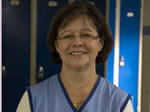
Otilia Marques was just 22 when she left her home in Ansiăo, Portugal, to join her sister and brother-in-law in Luxembourg.
Moving to Luxembourg
Like many Europeans, she moved to a new country in the hope of finding work and making a new life.
“It was difficult at first,” she remembers. “I had a job in a factory, but I was never taught French. I had to learn it all at work.” As one of seven brothers and sisters, she had been used to having people around her when she needed help.
Then, in 1975, she married her husband Manuel Augusto in Portugal. The following year he joined her in Luxembourg, where he now works for a building materials supplier. At the same time, Otilia started a new job as a cleaner for the post and telecoms company P&T. With the birth of their daughter Alexandra three years later, things seemed set fine for the future.
But Otilia was barely into her 30s when she became conscious of the rheumatic pain in her back, which grew more intense when she suffered a slipped disc. “For more than 20 years, I have suffered from pain that has made it difficult for me to work, and with age it gets worse. But I still try to do my best,” she says modestly. As a cleaner in the company changing and washroom area, she takes obvious pride in the shining mirrors and spotless tiles. Her tasks include scrubbing out showers, climbing ladders to dust lockers, carrying buckets full of water and emptying rubbish sacks….. it’s hard physical work. “Sometimes you can make the wrong movement and it hurts even more,” she explains. “But there’s no-one else to do it, so I have to manage.” And when the technicians come back from laying telecom cables in muddy trenches, especially in the winter, there is plenty to clean up.
An opportunity
So in September 2007, the company offered Otilia time off to attend a two-days-a-week training course over five weeks, co-funded by the European Union through the European Social Fund, to help her manage the pain. By coincidence, her daughter Alexandra was by then working for the Service de Santé au Travail Multisectoriel (STM – the government department responsible for health in different labour sectors) which organised the course, and she encouraged her mother to take up the opportunity.
Otilia found out how the back works, the risks of damage, and what to do to protect it. The trainers demonstrated exercises to build up her leg muscles, relaxation techniques to avoid strain, and even the right diet to improve her general health and strength. She discovered how to lift loads correctly, and move safely to avoid pain. “Thanks to the course, I know now that I have to get down on my knees – I can’t bend down, for example – and I take care not to fill the rubbish bags too full. I have learnt how to control my movements so I have less backache at work each day, and even at home. The training helped me because it explained what to expect.” There were even psychologists on hand to talk through participants’ problems.
Located on the outskirts of Luxembourg city, the telecoms headquarters where Otilia works is an angular, red-brick building on a spacious site surrounded by lawns and trees. This means that she can drive to work each day and park on company premises. “Although I don’t live far away, it helps me to come by car, also because I start very early – at 6 o’clock in the morning.”
Managing life and pain
For Otilia, daily life is a question of controlling the pain and reducing it to a manageable level. She refused surgery when she found it offered only a 20% chance of success. Instead, she has regular massage sessions, and once a year undergoes intensive therapy in the local spa town of Mondorf-les-Bains. She tries to avoid painkilling drugs. “I have treatment to try and stop the arthritis developing any further, because once that happens there’s nothing to be done,” she explains.
With Manuel, she lives in a bright, well-kept house with white walls, polished wood furniture and tiled floors. Red geraniums decorate the window sills, and here and there pieces of decorated pottery or other souvenirs evoke the colours of their native Portugal. Now Otilia is well enough to be able to enjoy taking a walk with their friendly six-year-old Labrador, Bell.
She hopes to be able to continue working until she reaches retirement age. “We’ll see how long it can go on,” she says philosophically. “It will take courage. I still feel pain, and sometimes I’m a bit depressed. It varies with the weather – when it rains it gets worse. But one has to try to keep going. You can’t always complain. You have to live with it.”
Nadine Sadler, from P&T’s health and social affairs service, says about 20 staff members a year undertake the back-pain training. “It really works,” she says. “I hope it will help Otilia to lengthen her working life.”
“It was a very useful course,” confirms Fatima Tomaz, who leads the team of 14 cleaning ladies in the building. “I have followed it myself, and I learned a lot.”
In pride of place on the wall of Otilia’s living room is a framed certificate, congratulating her on the progress she made on the training course, and encouraging her to put the lessons she learned into practice. It says a lot about how important that experience has been for her.
